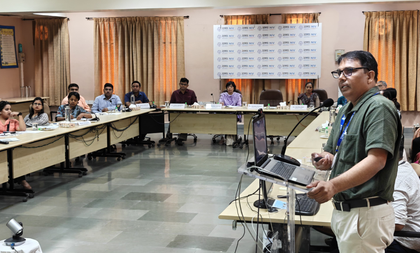ICMR-NIV Pune's computing facility key for India to fight future pandemics
By IANS | Updated: June 19, 2025 10:13 IST2025-06-19T10:09:08+5:302025-06-19T10:13:47+5:30
Pune, June 19 The recently inaugurated high-performance computing (HPC) facility at the ICMR-National Virology Institute (NIV) here, is ...

ICMR-NIV Pune's computing facility key for India to fight future pandemics
Pune, June 19 The recently inaugurated high-performance computing (HPC) facility at the ICMR-National Virology Institute (NIV) here, is a technology-driven and significant milestone in advancing India's public health research capabilities.
In a strategic step towards ‘Viksit Bharat 2047’, the state-of-the-art computing cluster, named NAKSHATRA, is expected to boost genomic research and surveillance, thus contributing significantly to the pandemic preparedness in the country.
The facility comes as the world is being increasingly threatened by several zoonotic spillover -- from animals to humans -- and vice-versa. This includes the SARS-COV-2 virus, responsible for the deadly Covid-19 pandemic and H5N1, commonly known as the bird flu, which wreaked havoc not only in the animal kingdom but also affected humans, among a host of others.
"From just 290 viral species and 2 virus families identified by the International Committee on Taxonomy of Viruses (ICTV) in 1971, the numbers have jumped to 14,690 viral species and 314 families in 2023," said Dr Naveen Kumar, Director of ICMR-NIV.
New viruses and genetic variants are being reported almost daily, he said. "The reason is increased globalisation, global warming and deforestation, which is driving the emergence of novel pathogen," Kumar explained, while speaking to reporters.
The HPC facility is developed under the Pradhan Mantri Ayushman Bharat Health Infrastructure Mission (PMABHIM). It forms the cornerstone of a new project titled “High Performance Computing Next Generation Sequencing (NGS) Hub”.
The initiative will revolutionise how genomic and bioinformatics data are processed in India. Crucially it will check the limitations the country faced during the Covid pandemic due to conventional computing infrastructure.
According to Kumar, the HPC cluster will be crucial in supporting rapid, data-driven responses to virus outbreaks ranging from Nipah, to Crimean–Congo haemorrhagic fever (CCHF), West Nile, Zika, Covid, mpox and H5N1 influenza A.
The NAKSHATRA HPC facility will play a key role in enhancing the country’s genomic surveillance and data analysis capacity and will prepare for a technology driven pandemic preparedness and future public health emergencies.
As the facility enables faster analysis of complex genomic data, it will help scientists in the country to make early detection of new disease threats. This will make the response to outbreaks more efficient, as well as accelerate AI-driven vaccine and drug development.
Notably, the newly commissioned HPC cluster features 12 compute nodes, offering a total of 700 cores and 1 petabyte of storage.
It will support complex bioinformatics workflows including NGS, transcriptomics, phylogenetics, metagenomics, and structural bioinformatics.
The facility will act as central repository for sequencing data and extending support to Viral Research and Diagnostic Laboratories (VRDLs). It will initially serve five ICMR institutes across the country.
Disclaimer: This post has been auto-published from an agency feed without any modifications to the text and has not been reviewed by an editor
Open in app